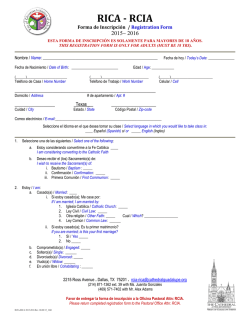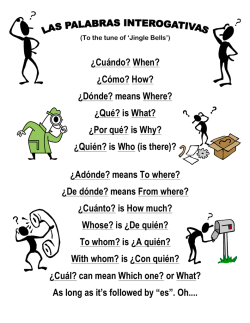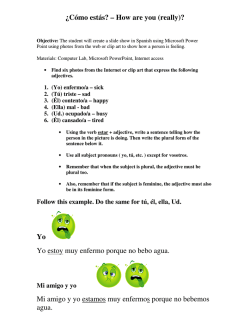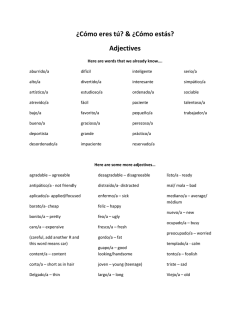
How are you doing? - ¿Cómo estás? - SchoolNotes
How are you doing? - ¿Cómo estás? Estar expresses condition, state, a subject's well-being, location (more temporary things) (PLACE). // Follow the following format: Estoy muy bien (I am very well.), o estoy un poco triste, o estoy muy contento. Estoy en la clase de español de Holy Family. Estoy en Dale City. YO ESTOY en la clase de español de Holy Family, o en Dale City, o en Virginia, o en Estados Unidos. Diana está en su oficina durante el almuerzo. (¿Dónde estás? ¿Dónde está Diana durante el almuerzo?) POSITION, LOCATION YO ESTOY escuchando la lección (listening to the lesson), prestando atención (paying attention), escuchando (listening), caminando (walking), corriendo (running), buscando algo (looking for something). ¿Qué estás haciendo? (What are you doing?) ACTION YO ESTOY excelente, muy bien, bien, regular/así así, un poco mal, mal, muy mal (Gracias. Y tu? Y Ud.?) (¿Cómo estás? o ¿Cómo te va? o ¿Cómo andas? o Hola. ¿Qué tal?) Estoy listo (I’m ready.) CONDITION YO ESTOY enfermo/a (sick). Está lloviendo (it’s raining), está nevando (snowing), está nublado (cloudy) ¿Qué tiempo hace? (What’s the weather like?) (characteristics that are subject to change) ¿Cómo estás? CONDITION YO ESTOY contento/a, feliz, alegre (happy), emocionado/a (excited.), sorprendido/a (surprised), triste (sad), deprimido/a (depressed), enojado/a (angry), furioso/a (furious)//¿Cómo estás? FEELING/EMOTION apurado/a (in a hurry)// impaciente (impatient)// loco/a (crazy)//sucio/a (dirty), limpio/a (clean)// celoso/a (jelous)// orgulloso/a (proud)// preocupado/a (worried) Estoy seguro/a (to be sure) You were sick yesterday. ¿Cómo estás hoy? Estoy mucho mejor (much better), Estoy un poco peor (a bit worse) Many of the adjectives used with SER are also used with ESTAR, but to imply a temporary condition: alto/a (tall) bajo/a (short) Roberto está alto. (Roberto is tall. Roberto may be a teenager who has grown a lot recently. He may not always be tall, so we use verbo estar.) The same goes for. . .inteligente (intelligent)// trabajador/a (hard working)//perezoso/a (lazy)//viejo/a (old), joven (young)//gordo/a (fat) delgado/a, flaco/a (thin)//rápido/a (fast), lento/a (slow)//desordenado/a (untidy), ordenado/a (tidy)//desobediente (disobedient), obediente (obedient)//bonita (pretty girl), guapo (handsome boy)// loco/a (crazy), normal (normal)//extraño /a, raro/a (weird)//fuerte (strong), débil (weak) //torpe (clumsy) Estoy haciendo la tarea (doing homework)//estoy sentado (I’m sitting), estoy parado (I’m standing) aburrido/a (bored)//cansado/a (tired)// nervioso/a (nervous), tranquilo/a (quiet, calmed)//asustado/a (scared)//ocupado/a (busy), libre (free) //cerrado (closed), abierto (open) (like a store)//solo/a (alone), acompañado/a (with someone) un poco (a bit); Juan está un poco aburrido. muy (very); Examples: Ella está muy ocupada. (She is very busy) muy cansado, muy tranquilo, muy emocionada For a negative sentence, put the word “no” before the verb. Ex. I am not sad…Yo no estoy triste.//Yo no estoy cansado. ESTAR conjugation: yo estoy (I am), tú estás (you are), él está (he is), ella está (she is), usted está ([formal] you are), nosotros/as estamos (we are), vosotros/as estáis (you all are – Spain), ellos/as están (they are), ustedes están (you all are – Latin America)
© Copyright 2026



